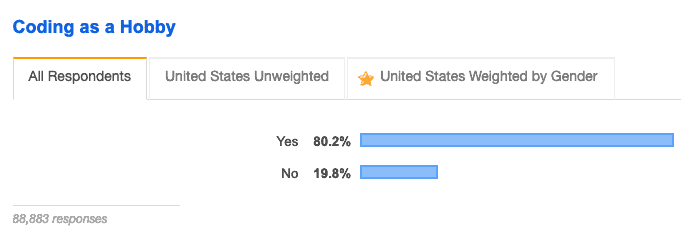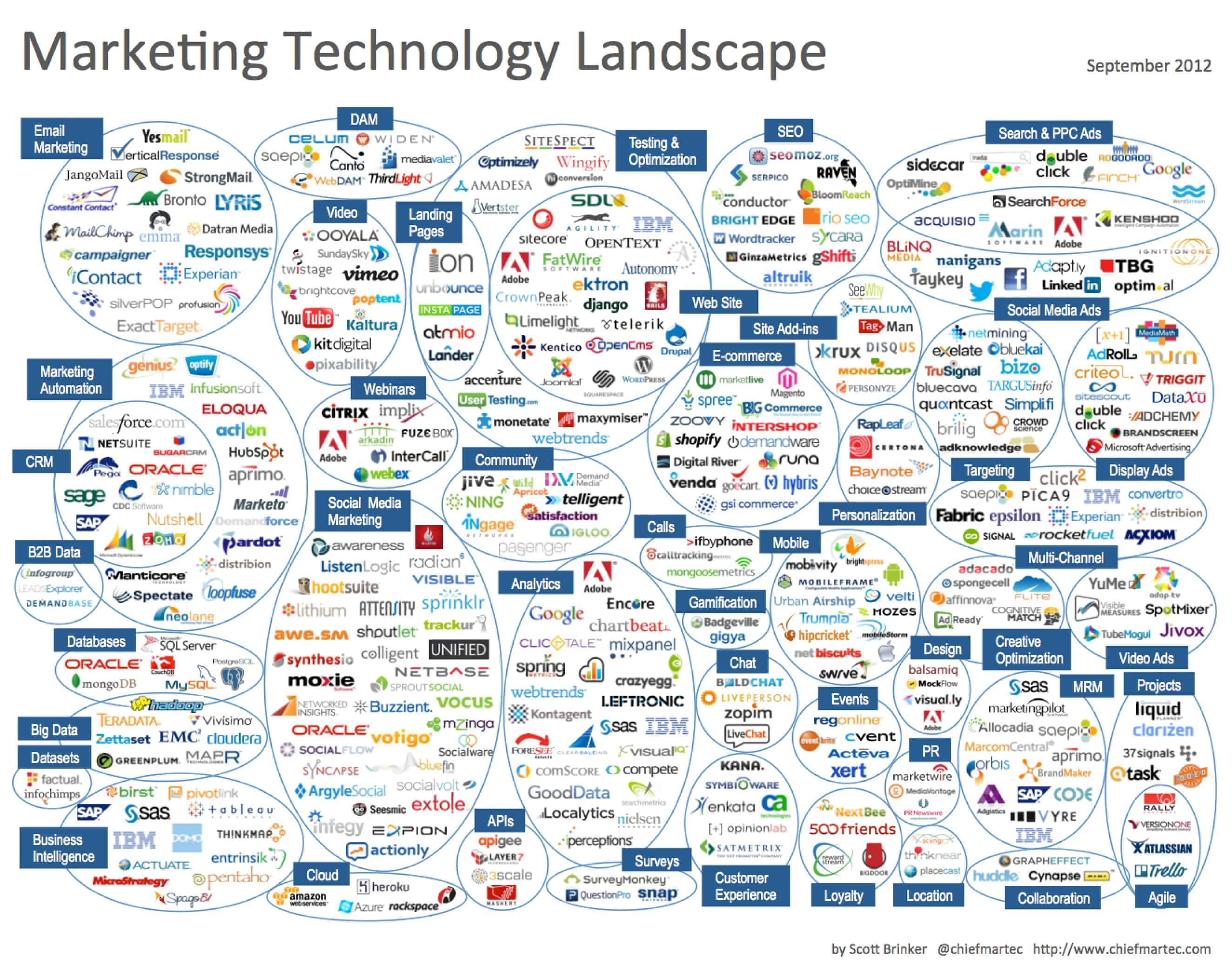If you've ever hired anyone, you know there's a few key skills you'd like every candidate to have: experience at the key tasks of the job, an ability to learn and level up quickly, and efficient with their time.
The vast majority of people that tend to check all those boxes have something in common: They all have had side projects during their careers.
Whether you look at designers on dribbble, engineering commits to open source projects on github, or blogs by people in sales, marketing, or product, side projects are everywhere.
In fact, Stack Overflow's 2019 survey of over 88,000 developers found that over 80% of them have side projects.
Yet, despite their value, many people hate on side projects. Years ago David Hauser of Grasshopper wrote a scathing post criticizing them as a distraction, or more recently, I saw a tweet by a prominent founder disparaging side projects as an instant disqualifier on resumes for his company.
Today, I want to offer a counter case for those of you more open minded. Their loss, is your potential gain.

Why Your Best Employees have Side Projects
There are tremendous advantages to employees with side projects that help them and your company or team. While some leaders frown upon them, many others realize how much they benefit from them.
Let's see what those backwards, possessive leaders are missing out on.
The benefits of side projects for you and your team members
The short sightedness of some leaders never ceases to amaze me. While some fear the distraction of side projects, here's just a few of the benefits that help you, your team, your company, and your team member with the side project.
1) Try new tools safely
Side projects provide an outlet to experiment with new technologies before suggesting your company use them. No amount of research compares to having used a new framework and being able to provide first person accounts of the tradeoffs and benefits.
While this is most notable for engineers keeping up to date with the every-evolving landscape of software development, other roles benefit just as much. If you've ever seen the break down of startups by category, you know there are more tools than you could every evaluate on your own:
Wouldn't it be nice if some of your team had already tried some of these tools and knew which could do what you needed? Or would you rather sit through 20 demos and hope the product delivers on its promises and has good customers support?
Employees with side projects shine in these moments.
2) Provide independence & creative outlets
Side projects provide a place where your employees can make all the decisions (for better and worse) versus the negotiations that often happen in a company. You can also call this their creative release, which then helps them be more compromising at work.
Dangerous situations like learned helplessness often come from only having one piece of work that is stuck and unable to make progress. Providing some variety in their life's work can help avoid the burnout that comes from only working on one thing for too long.
The value of a side project for me is not the creation of a thing of utility. It's the joy of practice and perfecting my craft. At my pace.
— Tobbe Gyllebring (@drunkcod) December 12, 2016
3) Develop mastery
Every leader would like their team to add more skills than when they hired them. It makes them more valuable employees, and gives you more value for the salary and title they have.
The ability to further hone their skills in a self-directed fashion, getting them to the 10,000 hours to mastery faster than standard work hours alone would provide is huge for you and them.
While they could study by reading books alone, it's the act of putting their study into practice that leads to the best learning and insights.
Building products, writing, and painting are not mental excercises, they are physical ones.
— Sahil (@shl) April 16, 2019
Reading to improve is like watching someone else workout – it does almost nothing for you.
To run better, run.
To paint better, paint.
To write better, write.
To build better, build.
4) Learn focus & efficiency
What can you get done in an hour? I bet early in your career it was hard to do much. Even today, with meetings, alerts, and chat, it can be easy to get trapped in reactive management mode.
Side projects teach you to get your work done efficiently, because you don't have every hour of the day to work on it. You learn the value of focusing quickly, eliminating distractions, and prioritizing ruthlessly.
The saying goes, "If you want something done, ask a busy person” for a reason. Team members I've hired who had side projects were some of the most efficient, and productive people I've ever worked with.
When I started out as a front-end dev, the company I was at used Django as a back-end framework. I built @UIMovement as a side project and used Django, which was massively helpful at the day job.
— Ramy (@ramykhuffash) May 2, 2019
5) Pay it forward
The ability to help the greater tech community through contributions to open source projects, events, sharing knowledge, and helping others, wouldn't exist without many people having side projects.
Your company has probably benefited from side projects in a variety of ways, too.
Most modern software development frameworks are open source projects, and if you've ever benefited from an event in your community, there was probably someone organizing it that had a different day job.
When your employees are the ones contributing to some of these projects, you create some positive karma for your company and brand as an employer.
6) Build a valuable network
Employees with side projects often collaborate on them with people outside their day job. This grows their learning and network.
Their larger network is valuable for you and them for a variety of reasons:
- When they're stuck on a problem at work, they have more people they can ask for help.
- When your team is recruiting, they know more people who could potentially join that they've worked with before and can vouch for.
- Their bigger networks may also help with partnerships, sales, and inside-scoops on other companies.
Networks are most helpful in moments you don't anticipate. You never know when a new perspective, or the right outside help is needed. Having more well-connected team members makes you more likely to have the help you need when it matters most.
Conclusion
Most people want to hire you only for things you've already done, creating a paradox of never breaking through because no one will hire you the first time to do it.
Great employees kick that door in, by doing it themselves.
I know, because once upon a time, I was an electrical engineer interested in software startups.
I started my own side project, which proved my abilities to market, sell, and most importantly be a product manager. It was those efforts 10 years ago that led to my first job as an associate product manager, and side projects since have helped me keep leveling up rapidly.
Most people I know with side projects do the same; they continue growing, learning, and doing side projects outside of work, putting them on a trajectory much steeper than the employee who just shows up to work, and then goes home.
Next time you have the chance to hire someone you know has side projects, strongly consider hiring them. You'll benefit much more than you may expect.








